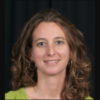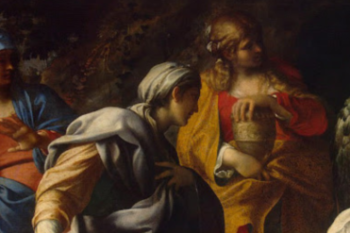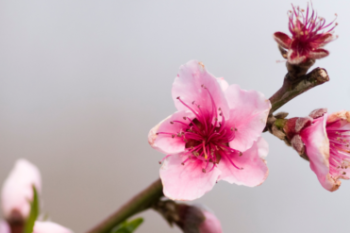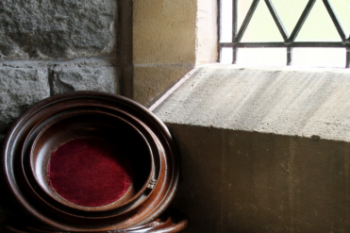“Holy is the Mouse”: Science and Faith in Yaa Gyasi’s Transcendent Kingdom
Yaa Gyasi’s second novel, Transcendent Kingdom, opens with epigraphs from poets Gerard Manley Hopkins and Sharon Olds. The quotation from Hopkins, though over a century earlier than Olds’, is probably the less obscure: “the world is charged with the grandeur of God./It will flame out, like shining shook from foil.” Hopkins’ full poem speaks to the mystery and consistency of God’s spirit among us, despite our inattention or preoccupation with “trade” and “toil.” Creation’s beauty will “flame out” when we least expect it, because the Holy Ghost “broods with warm breast” bringing each fresh, new morning. The disconnect between human creatures and the mothering Spirit frames Gyasi’s own exploration of faith, loss, and family. The second epigraph from Sharon Olds comes from her poem “The Borders” (The Unswept Room, 2002): “Nothing comes into the universe / and nothing leaves it.” If Hopkins’ poem offered a macro-focus on the grandeur of the world, Olds’ poem offers a micro-focus on a mother’s body, like a camera zooming in on that brooding mother hen with bright wings. The poem’s 30 lines trace the permeability between a mother and daughter, asking what it means, and what it costs, to occupy those roles. Taken together, these two epigraphs and their full contexts frame the novel’s vast scope: to find ourselves in the “infinite extent of our relations” (7). Gyasi wrangles hard questions of faith and suffering with authenticity and intimacy, but she also manages to avoid sentimentality with her scientist-narrators’ precise and pragmatic voice.
Gifty is the second child born to Ghanian immigrants living in Huntsville, Alabama. Her brother, Nana, is the “miracle” baby, a bright light for his older parents. Gifty is a less-welcome surprise, a more difficult baby and a disturbance to the family’s holy trinity. Her father, known throughout the novel as The Chin-Chin man and nothing else, is perhaps unsurprisingly unhappy in the deep South, where he experiences discrimination and loneliness. Detached from his country and demeaned for the color of his skin, he longs to return to Ghana. Though he prizes Nana especially, he leaves to visit his homeland and never returns. He promises that he will come back “soon,” but as the weeks stretch to months, absence becomes a steady erosion instead of a clean break. For a few uneventful years, their world consists only of school, their deeply evangelical church, and Nana’s sports teams.
Gifty narrates from her late 20s, now a brilliant neuroscientist at Stanford who studies addiction and reward-seeking behaviors. In the wake of her brother’s overdose when he is a teenager and she is just 11, Gifty’s mother collapses in on herself leaving Gifty to navigate both their griefs alone. Like her own mother, whom Nana describes as “a rock,” Gifty hardens into a perfect, shining example of childhood that might prove the “exception to the rule.” She wants to be so good and so pure that no one could equate Nana’s addiction with his blackness (as she overhears two church members discuss) or with his entire personality. She begins to question the church’s altruism when they only seem to forgive in theory rather than in practice. Eventually, she chooses the rigor of science precisely because her church rejects questions and learning as a “trap of the secular world designed to undermine one’s faith” (127). The God of her youth failed her, as did her own father, who became just a disembodied voice on a crackly, static-filled line. She believed she was not enough to warrant either her father’s attention or God’s intervention.
This is a story of strength and frailty, of learning how to live despite what seems to be a full portion of suffering. Gifty observes that “to be alive in the world every day, as we are given more and more and more, as the nature of ‘what we can handle’ changes and our methods for how we handle it change too, that is something of a miracle” (244). She needs to know why we hurt the ones we love, why our love isn’t enough to keep those around us from self-destructing. When the Ghanian pastor claims that her mother was “healed” and rose from her bed because God commanded her to rise, it does not compute. Why would God wait so long to call her mother from her bed? Why is her mother’s healing incomplete? Why wasn’t Gifty enough to motivate that healing?
Though Gifty eventually rejects the evangelicalism of her mother and her youth, she can never quite shake her sense that the world is indeed charged with the grandeur of God. Gifty turns to science because she wants better answers. Ironically, she felt more surety in her insulated evangelical faith—certain of others’ sin and of her place in the cosmos. Science teaches her to ask better questions and to be more comfortable in the “not knowing.” Her high school science teacher, Mrs. Pasternak, tells her, “We don’t know what we don’t know. We don’t even know the questions we need to ask in order to find out” (32). And so, Gifty dedicates her life to asking better questions:
The ending, the answer, is never the hard part. The hard part is trying to figure out what the question is, trying to ask something interesting enough, different enough from what has already been asked, trying to make it all matter (162).
Her questions sometimes lead her to confront herself, her own pain. She cannot explain the dark laughter that erupts in her confrontations with her lover or her best friend. She craves love, but is discomfited by demonstrations of love, and she sabotages relationships that might lighten the load she carries. As a child, she writes in her journal, “God, will you show me that you’re real?” (101). Notably, the narrative immediately jumps from young Gifty to Gifty’s present-day apartment where her mother is up and cooking jollof rice for the first time in days. Gifty may not be able to see God, but she can see her mother cooking, a sight “familiar to [her] as [her] own body” (102). The first lines of Olds’ poem read:
To say that she came into me
from another world, is not true.
[…] She began to exist
Inside me—she appeared within me.
Her mother’s love comes into her, appears within her, because those borders are indistinct. Her mother in the kitchen cooking brings her closer to Alabama and Ghana, to her brother and father, and to herself. Despite Gifty’s attempts to insulate herself, sometimes the world opens up to her anyway. Moments like this in the kitchen or in her lab feel like communion and she realizes that “there is a kind of holiness in our connection to everything on Earth. Holy is the mouse. Holy is the grain the mouse eats. Holy is the seed. Holy are we” (92). Maybe God answered her after all.
Her mother’s body is as familiar to Gifty as her own, despite their mutual reticence. Gifty (whose own name means tall, beautiful girl) only ever refers to her mother by her role as mother or as “the black mamba” in her journal, alternately nurturing and dangerous. Only as an adult can she admit that her mother isn’t hers to possess (220). And like so many daughters, she possesses and rejects simultaneously, defining herself in relation to and opposition to her mother. Olds writes: “I served her willingly and then / became very much like her, fiercely/ out for myself.” In what feels almost a paraphrase of Olds’ lines, Gifty says, “I had become my mother in so many ways that it was hard to think of myself as distinct” (246). She knows her mother only in that role, and when her mother emerges from that fog “as herself […] there’s dissonance” (222). Olds also blurs the distinctions between mother and daughter:
When my daughter was in me, I felt I had
a soul in me. But it was born with her.
But when she cried, one night, such pure crying,
I said, I will take care of you, I will
put you first. I will not ever
have a daughter the way she had me.
I will not ever swim in you
the way my mother swam in me and I
felt myself swum in. I will never know anyone
again the way I knew my mother,
the gates of the human fallen.
Gifty’s mother seems almost unknowable, perhaps because her soul lives outside her body, in her children, in her lost son. Gifty glimpses her mother, their shared grief, and crucially, herself through those permeable borders where the gates fail. The night Nana died, her mother cried until she was dehydrated. In that moment, her mother swims in her and Gifty decides to take care of her mother by perfecting herself.
Gifty’s mother is hard and soft, strong and weak, loving and cruel. When Gifty asks her mother if she is pretty, her mother grabs her by the shoulders and marches her to the mirror: “Look at what God made. Look at what I made.” (23). Gifty shifts her gaze, but her mother forces her to look again until it is time to leave. When her mother kisses her own reflection in the mirror, Gifty mimics her behavior. These small moments convey love to her daughter, even if saying “I love you” is, as she calls it, “white people’s foolishness.” Young Gifty admires her mother, in awe of the “wellspring of strength she seemed so capable of drawing from” (153). She watches as her mother attends to the sick and the dying, tenderly and pragmatically, her mother telling her that “there is no living thing on God’s earth that doesn’t come to pain sometime” (222). But the human animal is as complex and vulnerable as the mice in Gifty’s experiments, and the wellspring seems to run dry. Only later is Gifty able to translate her mother’s work, its physicality and intimacy, as the compassion that it is. Gifty recalls the ghost stories her mother recounted from her early days alone in America, her own desire for touch and connection. Years later, when her mother lies in Gifty’s queen bed, face toward the wall, Gifty strokes her back tenderly because the energy of human touch flowing “toward the body of the person in need” is holy (252). When she lowers her mother into the bathtub, she soaps her gently, massages her hands. In that moment, her mother looks into her eyes and tells her it will be alright (260). Gifty finds that being saved is less about sinning and not sinning and more about saying “walk with me” (252). (See also 149—all those hands stretched out toward me).
To “transcend” can mean to means to go beyond or exceed either a physical or immaterial limit. In theology, transcendence might mean a deity who surpasses material forms but sustains them, indwells them nonetheless, the God of grandeur in Hopkins’ poem. A Transcendent Kingdom could easily be, in the language of the Christian story, a world charged with God’s spirit, or perhaps the new heaven and earth of Revelation. But it could just as easily be this earth, “shining from shook foil” a “dearest freshness deep down” (Hopkins). In the language of science, a kingdom describes a grouping of life on earth. Kingdom Animalia includes all multi-cellular, eukaryotic life from hamsters to humans. Humans, the species Homo Sapiens, are the most complex animal on earth, the only ones, as Gifty recalls her biology teacher saying, “who believed they had transcended their Kingdom. (21). Was he referring to the belief that we have transcended the limits of our cells and our bodies or perhaps the belief that we have transcended the need for connection, that we don’t need anyone to walk with us? Gifty spends her days with lab mice, always in pursuit of understanding the “little organ inside this one tiny mouse” though it would “still not speak to the full intricacy of the comparable organ” inside the human head. For Gifty, the human brain, the center of belief, of transcendence was “infinite, unknowable, soulful, perhaps even magical” (21). What scientist Gifty once called the “soul,” that “inexplicable essence of ourselves” could be explained by electrical signals and synapses, but every time she sees a brain, she feels reverence. As she comes to realize, her soul is still a soul even if she doesn’t call it that anymore. Is the Transcendent Kingdom a place or a feeling? Is it moving past the obstacle of self in order to realize the infinite extent of our relations? Or is it our recklessness with our bodies, our loves? Gifty does not need another, ethereal world, because as she slowly learns, “nothing comes into the universe and nothing leaves it,” not grief, not love, not the soul—those things are all an intimate part of the ache of being human. She learns that making meaning of the world requires making room to love herself, to grasp the hands extended to her.
Transcendent Kingdom offers an achingly profound portrait of relationship, faith, and loss. Like Gifty and her mice, Gyasi probes those dark corners of our brains we sometimes prefer not to confront, a novel full of questions that leads to more questions. James Wood, who reviewed the novel for The New Yorker, criticizes Gyasi’s ending as being too tidy, and for rejecting the tension between faith and science so carefully constructed throughout the novel. But while I agree that the ending comes quickly, it also follows a scene in which Gifty asks for some sign, some miracle that would heal her mother. Gifty does not get her biblical, Jonah-sized miracle, but instead, just “streetlamps shining their dim light” (262). To my mind, Gyasi tips her hat to the that dim light in the dark, the mystery just beyond our vision. Mrs. Pasternak’s words echo softly here—we don’t know yet what we don’t know, we don’t see clearly. Gifty spends her life trying to make meaning of tragedy, and in the end, she still has to carry it with her. Wood reads her final scene as an authorial flinching from the hard question: what if there is no meaning? But I don’t think she flinches here, I think she realizes that borders are illusory, that there are always permeable gates. In this final scene Gifty isn’t praying or waiting to hear God’s voice, rather, she simply observes all the familiar human emotions ranging across the face of Christ: anger, pain, joy. To be here, to bear witness–that is meaning enough. Maybe a better question is—how do we walk with one another through this life?
Transcendentalist writer and naturalist Henry David Thoreau claimed that “the purest science is still biographical.” To the transcendental mind, science could not be considered separately from the people doing the science, despite the objectivity and rigor in the approach and method (Faith in a Seed 7). Faith, doubt, mystery, loss, the holiness of a mother’s grief—all these things form an integral foundation for Gifty’s science because they are integral parts of her. The novel’s central question is not just “who am I?” but “who am I without you?” and maybe truly, “who am I with you?” The “infinite extent of our relations,” (itself a quotation from Thoreau that Gifty highlights early in the novel) brings us into the messy, holy beauty of this world that is “never spent.” I contend that Gifty does not bow her head at the end of the novel, not because she dismisses the tension between faith and science but rather, because she is acknowledging the belief motivated her life and work. Like the permeable borders between mother and daughter, the borders between faith and science in her work seem less rigid than she might have hoped, the world, charged with grandeur. Gyasi asks us to consider what we it might mean to embrace the stories and lives that form us, to hold their gaze, to light a candle in their honor against the darkness.
Here are the links to the two epigraph poems, God’s Grandeur by Gerald Manley Hopkins and The Borders by Sharon Olds.
View the Emmanuel Christian Seminary at Milligan Academic Programs page here.




